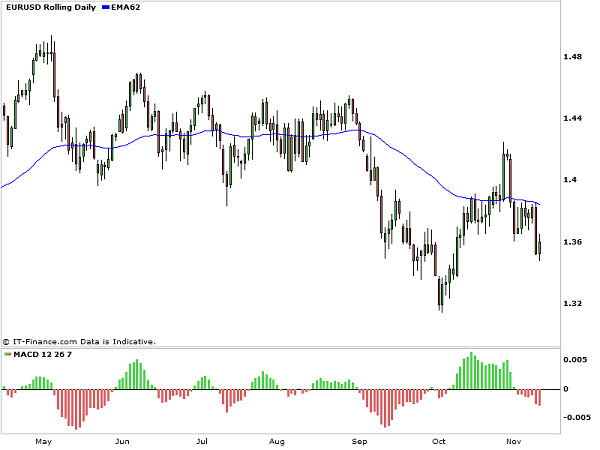European growth forecasts were slashed on Thursday amongst increasingly uncertainty about the economic health of the forthcoming year. The figure was previously a modest 1.8% growth expectations coming from many analysts who believed that the majority of the financial problems in Europe would be under control, if not resolved. This was radically reduced to just 0.5% today. The past two weeks has been dominated by sovereign debt problems and little has been mentioned of the economic health of France and Germany who are Europe’s largest economies. Evidence today from some stocks show that their economic outlook is not as positive as expected.

Currency markets continued to be weighed down by the European debt crisis and the news that Italy´s bond yield hit a high of 7% yesterday. This level indicates the interest rate that Italy has to pay on its loans and suggest that the country may soon require financial assistance in the form of a bail-out. As a result, the Euro recorded its largest single-day fall in value for 15 months on Wednesday. It continued to fall overnight as the Asian trading session took stock of the widening European problems, pushing the Euro to a monthly low against the US Dollar of around $1.3480. The Dollar, meanwhile, continued to strengthen as investors seek to buy the low-risk currency whilst the financial problems remain. Given that the Australian dollar is viewed as a comparatively risky asset and has a tendency to follow the price fluctuations of the Euro, it too has weakened overnight.
Commodities are also trading in line with the European situation. Crude oil has fallen sharply against the background of instability to around the $94.50 a barrel. Oil tends to trade in line with the US stock market, and therefore falls as the S&P500 (the United States 500 largest companies) futures indicate that markets are due to open around 2% lower today. Gold and silver are both stuck in a range at around $1.790 and $34.66 respectively, as investors buy these safe-haven commodities. The reason why their price can seen to be static is that this demand is offset by investors also buying US Dollars. The demand for dollars is rising and investors often sell Gold in order to gain US dollars. Therefore these precious metal commodities have both buying and selling pressure and thus currently have no clear direction.
Stock markets globally have reacted negatively to the news that Europe´s third-largest economy may be on the brink of financial meltdown. Confidence in European banking shares to be able to cope with the impending debt crisis has weighed heavily on this sector. Included in this was Credit Agricole (CAGR.PA), France´s third-largest bank which posted a slump of 65% on third quarter profits today.
At today’s open, the FTSE100 (the UK´s largest 100 companies) was trading lower by 1.1%. Similarly the German DAX, the stock market of Europe´s largest economy, traded 1.23 lower at the opening today. These fall come in the wake of the Japanese Nikkei which fell sharply by 2.9% during last night’s trading. To reinforce the market´s current pessimism, Siemens, one of Germany’s strongest stocks announced today that it would be reducing its end of year dividend to investors in light of its quarterly operating profits falling below market expectations.
Comments (No)